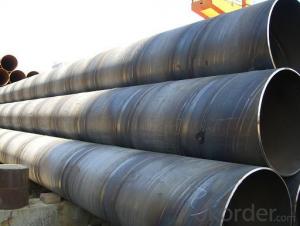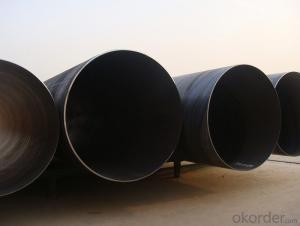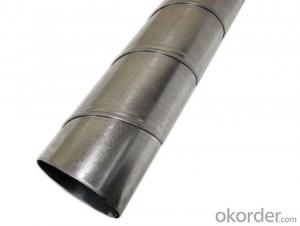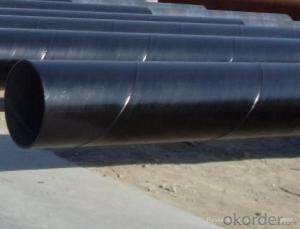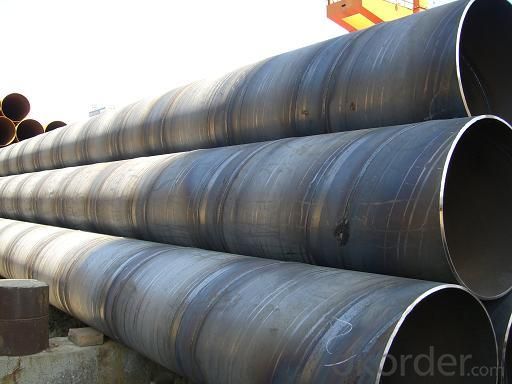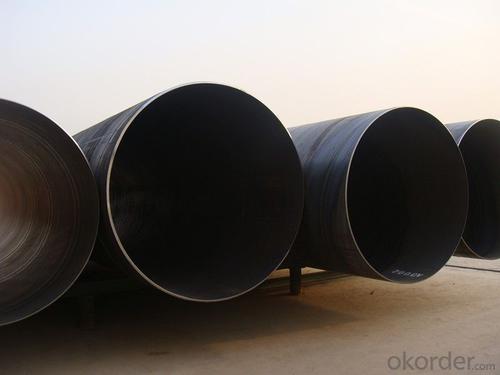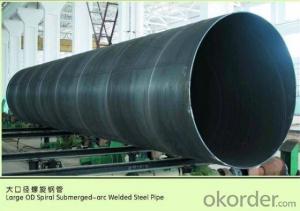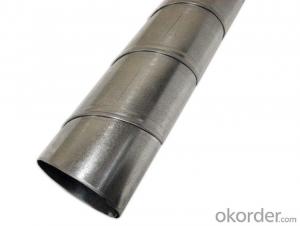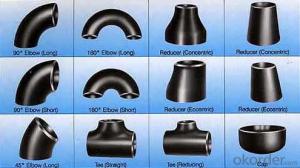SPIRAL CARBON STEEL PIPE 32’‘-48''
- Loading Port:
- China Main Port
- Payment Terms:
- TT OR LC
- Min Order Qty:
- -
- Supply Capability:
- -
OKorder Service Pledge
OKorder Financial Service
You Might Also Like
Packaging & Delivery
Packaging Detail: | standard export packing or as customer's requirement |
Delivery Detail: | within 10 - 30 days |
Specifications
Spiral Welded Steel Pipes and Tubes
1.Material:Q195-Q235
2.Length:1-12m
3.WT:1.0-14mm
4.O.D.:20-273mm
Spiral Welded Steel Pipes and Tubes
Product Description:
1.Material : Q235,Q345,L245,L290,L360,L415,L450,L485,GrB,X42,46,X52,X56,X60,X65,X70,X80,X100
2,Standard: SY/T5037-2000,GB/T9711-2011,API Spec 5L PSL1/PSL2,ASTM A252\A53,ISO3183,DIN17172,EN10217,JIS G3457,AWWA C200,ASTM A139,ASTM A671,ASTM A672
3.Wall thickness: 3.0mm-30mm
4.Outer diameter: φ168mm-3020mm
5,Length: 5m-12m or as your requirement
6,Corrosion protection standard: DIN30670,DIN30671, AWWAC210, AWWA C203, SY/T0413-2002,SY/T0414-2002
7,Application: Oil, gas, natural gas, water pipe, thermal electricity pipe, steel structure engineering, etc
Q195-q345 Material Steel Pipe's Materials
Elements | Chemical Compsition% | Mechanical Property | ||||||
| C% | Mn% | S% | P% | Si% | Yield Point (Mpa) | Tensile Strength(Mpa) | Elongation |
Q195 | 0.06-0.12 | 0.25-0.50 | <0.050 | <0.045 | <0.030 | >195 | 315-430 | 32-33 |
Q215 | 0.09-0.15 | 0.25-0.55 | <0.05 | <0.045 | <0.030 | >215 | 335-450 | 26-31 |
Q235 | 0.12-0.20 | 0.30-0.70 | <0.045 | <0.045 | <0.030 | >235 | 375-500 | 24-26 |
Q345 | <0.20 | 1.0-1.6 | <0.040 | <0.040 | <0.55 | >345 | 470-630 | 21-22 |
- Q: How are steel pipes protected against external corrosion in coastal areas?
- Steel pipes are protected against external corrosion in coastal areas through a combination of coating and cathodic protection measures. One of the most common methods used is the application of a protective coating on the surface of the steel pipe. This coating acts as a barrier between the steel surface and the corrosive elements present in the coastal environment, such as saltwater and humidity. The coating is typically made of materials like epoxy or polyethylene, which are resistant to corrosion and provide a long-lasting protective layer. In addition to coating, cathodic protection is also employed to further safeguard the steel pipes from corrosion. Cathodic protection involves the use of sacrificial anodes or impressed current to prevent the corrosion of the steel. Sacrificial anodes are made of more reactive metals, such as zinc or aluminum, which are attached to the steel pipe. These anodes corrode instead of the steel, sacrificing themselves to protect the steel surface. Impressed current systems, on the other hand, use an external power source to provide a protective current to the steel, preventing corrosion. Regular inspection and maintenance of the protective coating and cathodic protection system are crucial to ensure their effectiveness. Coatings may deteriorate over time due to wear and tear, requiring periodic inspection and reapplication if necessary. Similarly, sacrificial anodes need to be replaced when they are depleted, and impressed current systems require monitoring and adjustment to maintain the desired level of protection. Overall, by combining effective coating techniques with cathodic protection measures, steel pipes in coastal areas can be adequately protected against external corrosion, ensuring their longevity and optimal performance.
- Q: Can steel pipes be used for transporting hazardous materials?
- Yes, steel pipes can be used for transporting hazardous materials. Steel is known for its strength and durability, making it suitable for handling and containing hazardous substances. It is commonly used in various industries, such as oil and gas, chemical, and wastewater treatment, to transport materials that pose a potential risk to human health or the environment. Additionally, steel pipes can resist corrosion and high pressure, ensuring the safe transportation of hazardous materials.
- Q: How are steel pipes used in the construction of high-rise buildings?
- Steel pipes are commonly used in the construction of high-rise buildings for various purposes, including structural support, plumbing, and fire protection. These pipes provide strength and durability to support the weight of the building, allowing for taller structures. They are used to create the building's framework, as well as for the distribution of water, gas, and other utilities throughout the building. Additionally, steel pipes are often used for fire sprinkler systems, providing a reliable and efficient method of fire protection in high-rise buildings.
- Q: What is the role of steel pipes in sewage systems?
- The role of steel pipes in sewage systems is to provide a durable and reliable means of transporting wastewater and sewage from homes, businesses, and other sources to treatment plants or disposal sites. Steel pipes are known for their strength, corrosion resistance, and longevity, making them suitable for withstanding the harsh and corrosive nature of sewage. They are capable of handling high-pressure flows and can withstand the weight and pressure of the surrounding soil. Additionally, steel pipes are often used in larger diameter applications due to their ability to carry larger volumes of sewage efficiently.
- Q: How are steel pipes used in the manufacturing of machinery and equipment?
- The manufacturing of machinery and equipment heavily relies on the widespread utilization of steel pipes, thanks to their numerous advantageous properties. These pipes serve as a primary means of conveying different materials, fluids, and gases within the machinery, effectively ensuring safe and efficient transportation. One crucial application of steel pipes in machinery manufacturing lies in the realm of hydraulic and pneumatic systems. Hydraulic systems depend on steel pipes to transmit power and regulate fluid flow, while pneumatic systems utilize these pipes to transport compressed air, powering various components. The strength and durability inherent in steel pipes guarantee their ability to withstand the immense pressure and forces exerted by these systems, making them a dependable choice for such purposes. Moreover, steel pipes find extensive use in the construction of machinery frames and structures. Their exceptional tensile strength and resistance to corrosion make them an ideal option for providing structural support and stability to heavy machinery. These pipes can be effortlessly welded, bent, and fabricated into diverse shapes, allowing for flexibility in design and enabling the creation of intricate machinery structures. Furthermore, steel pipes play an indispensable role in the transportation of raw materials and finished products throughout the manufacturing process. They frequently serve as conduits for the movement of liquids, gases, and granular materials, ensuring the smooth operation of machinery and equipment. Steel pipes are particularly well-suited for handling abrasive and corrosive materials, as their robust construction guarantees minimal wear and tear over time. In conclusion, the extensive utilization of steel pipes in the manufacturing of machinery and equipment stems from their strength, durability, and versatility. Whether it be for hydraulic systems, structural support, or material transportation, steel pipes form an integral component that significantly contributes to the efficiency and dependability of machinery across various industries.
- Q: What are the common uses of steel pipes in construction?
- Steel pipes are commonly used in construction for various purposes due to their durability and strength. One of the most common uses of steel pipes in construction is for plumbing systems. Steel pipes are often used to carry water, gas, and other fluids throughout a building. They are preferred over other materials due to their resistance to corrosion and ability to withstand high pressure. Another common use of steel pipes in construction is for structural support. Steel pipes are often used as columns or beams to provide structural integrity to buildings. They can support heavy loads and provide stability to structures, making them a popular choice in the construction industry. Steel pipes are also commonly used in the construction of bridges and highways. They are used for creating strong and durable bridge supports, guardrails, and signposts. Steel pipes are able to withstand extreme weather conditions and heavy traffic, making them a reliable choice for infrastructure projects. Furthermore, steel pipes are used for underground utilities such as sewer and drainage systems. They provide a strong and long-lasting solution for transporting wastewater and preventing leaks. Steel pipes are also used in the construction of underground tunnels and pipelines. In addition to these common uses, steel pipes are also utilized in construction for fencing, scaffolding, and handrails. They are chosen for their strength, versatility, and ability to withstand harsh environmental conditions. Overall, steel pipes are an essential component in construction due to their numerous advantages. Their durability, strength, and resistance to corrosion make them a reliable choice for various applications in the construction industry.
- Q: What are the common standards for manufacturing steel pipes?
- The common standards for manufacturing steel pipes include the American Society for Testing and Materials (ASTM) standards, the International Organization for Standardization (ISO) standards, and the American National Standards Institute (ANSI) standards. These standards cover various aspects such as material composition, mechanical properties, dimensions, testing procedures, and quality control requirements to ensure the consistency and reliability of steel pipes.
- Q: What are the main aspects of precision steel tubes?
- Precision tube is a kind of seamless steel tube with high precision and high brightness produced by cold drawing or cold rolling.
- Q: How are steel pipes marked for identification?
- Steel pipes are typically marked for identification using various methods such as color coding, stenciling, engraving, or applying tags with relevant information such as size, grade, manufacturer, and specifications.
- Q: Can steel pipes be used for steam systems?
- Yes, steel pipes can be used for steam systems. Steel pipes are commonly used in steam systems due to their high strength, durability, and heat resistance properties. Additionally, steel pipes can withstand high pressures and temperatures, making them suitable for transporting steam safely and efficiently.
Send your message to us
SPIRAL CARBON STEEL PIPE 32’‘-48''
- Loading Port:
- China Main Port
- Payment Terms:
- TT OR LC
- Min Order Qty:
- -
- Supply Capability:
- -
OKorder Service Pledge
OKorder Financial Service
Similar products
Hot products
Hot Searches
Related keywords
